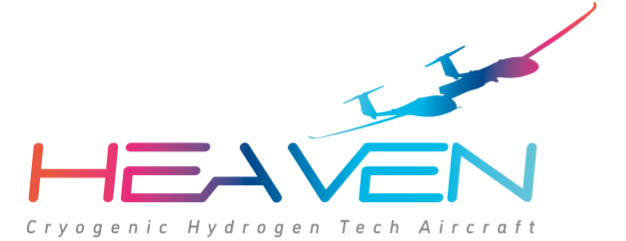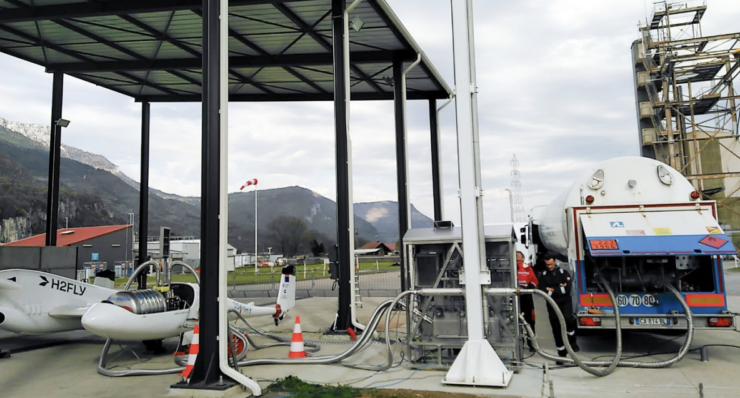- H2FLY successfully tested filling procedure with liquid hydrogen (LH2) in an on-ground test with its hydrogen-electric aircraft HY4
- In following coupling tests, liquid hydrogen is supplied from an aircraft-integrated LH2 tank to a fuel cell system and coupled with it, to generate power
- This world-first milestone is the latest development in the use of liquid hydrogen to power aircraft
5th April 2023 – H2FLY, the Stuttgart-based developer of hydrogen fuel cell systems for aircraft, today announced that it has successfully passed liquid hydrogen on-ground filling tests with the newly developed liquid hydrogen tank which is integrated into its HY4 aircraft. The efforts are part of the European project HEAVEN, a consortium of five partners to demonstrate the feasibility of using liquid, cryogenic hydrogen-powered fuel cell powertrain in aircraft, led by H2FLY.
H2FLY has successfully passed the filling tests of the new liquid hydrogen storage system which is designed and supplied by its project partner Air Liquide based on H2FLY’s requirements. The filling procedure took place in preparation for the forthcoming coupling tests in which the liquid hydrogen storage system will be coupled with the fuel cell system to form a complete hydrogen-electric powertrain. H2FLY led the test campaign on Air Liquide’s Campus Technologies Grenoble, in Sassenage, France together with Air Liquide.
By reaching this milestone, the consortium demonstrates world-leading experience in liquid hydrogen refuelling operations and liquid hydrogen handling on board of an aircraft.
Prof. Dr. Josef Kallo, co-founder and CEO of H2FLY says “The successful on-ground filling tests today, mark the next milestone in our pursuit to doubling the range of our HY4 aircraft. It is a critical step for our upcoming flight test campaign this summer, which will demonstrate the feasibility of liquid hydrogen as a fuel for medium and long-haul flight.”
This filling milestone follows the company’s announcement in November 2022 that it had started the mechanical integration of Air Liquide’s liquid hydrogen tank into H2FLY’s fuel cell-powered aircraft HY4 after the tank passed the vibration and LH2 leakage tests in September 2022.
For more than 10 years, H2FLY has been researching, testing, and refining, resulting in the development of the HY4, a four-seat aircraft with hydrogen-electric propulsion, that first took flight in 2016. There have been several key milestones across the past three years, including:
- In 2020 H2FLY was granted a permit to fly the latest generation of the HY4 aircraft, which featured a fully redundant powertrain architecture. Across more than 100 take-offs the company successfully demonstrated the applicability of hydrogen-electric propulsion solutions in aviation
- In 2021 the company signed a strategic partnership with aircraft manufacturer Deutsche Aircraft that will see the companies work together to fly a CS25 class aircraft powered by H2FLY’s hydrogen fuel cell technology. The climate-neutral regional aircraft demonstrator is expected to fly in 2025
- Earlier last year, the company completed a cross-country flight, from Stuttgart, Germany to Friedrichshafen, covering 77 miles, marking the first time a hydrogen-powered passenger plane has flown between two commercial airports
- Also last year, the company set what is believed to be a world altitude record for a hydrogen aircraft, flying at 7,230 feet, confirming the company’s position as a leader in this new category
About H2FLY:
H2FLY was founded by five engineers from the German Aerospace Center in Stuttgart and the University of Ulm, H2FLY GmbH is working to deliver to market the first qualified, fully hydrogen-electric aircraft powertrain. By bringing hydrogen fuel cell technology to the next level, H2FLY will unlock the era of emission-free, sustainable air travel. The company develops hydrogen-electric propulsion systems for aircraft and is a global leader in the development and testing of such systems. The HY4, the world’s first hydrogen-electric passenger aircraft, first took off in 2016, demonstrating both the feasibility and potential of this technology for the aviation of the future. H2FLY has a powerful network of partners in industry and science, and is currently working to accelerate its technology development and commercialization with the support of German and European partnerships. In just a few years, hydrogen-electric aircraft are expected to be able to transport 40 passengers over distances of up to 2,000 kilometres (1,240 miles).
For more information, please visit: www.H2FLY.de.
About HEAVEN:
Project HEAVEN is funded by the Fuel Cells and Hydrogen 2 Joint Undertaking (FCH 2 JU) under grant agreement no. 826247. The public-private partnership FCH 2 JU supports research, technology development and demonstration activities in fuel cell and hydrogen energy technologies in Europe. HEAVEN is part of the “Horizon 2020” research and innovation programme funded by the European Union as well as Spain, France, Germany and Slovenia. In addition to H2FLY, the HEAVEN consortium is made up of the following partners: Air Liquide (the designer and supplier of cryogenic tanks), Pipistrel Vertical Solutions (which supports the integration and testing of the tank), the DLR German Aerospace Center (which supports the operation and testing of the high-performance fuel cell and system architectures), and EKPO (which works on the fuel cell stack).
Press contact
H2FLY
Melanie Lienerth
presse@h2fly.de
Rachel McDonald
h2fly@ragency.co

